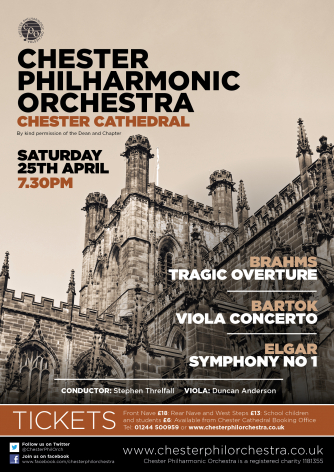Details
Chester Cathedral
Saint Werburgh Street
Chester
Cheshire
CH1 2DY
England
Programme
Johannes Brahms – Tragic Overture, Op.81
Béla Bartók – Viola Concerto
~ Interval ~
Edward Elgar – Symphony no.1 in A flat major, Op.55
Performers
Stephen Threlfall – Conductor
Duncan Anderson – viola
Chester Philharmonic Orchestra
Programme Note
One cannot discuss Brahms’ Tragic Overture without mentioning his Academic Festival Overture. Both were written at the same time and their first performances within days of each other with the Tragic Overture being performed at the same concert as the Academic Overture. This caused quite a stir because the Tragic is very solemn whilst the Academic is light hearted. The Tragic Overture is non programmatic and does not represent any specific tragedy. It has been postulated that Brahms wanted to compose an overture to Goethe’s Faust, but Brahms himself wrote to a friend , “I could not refuse my melancholy nature the satisfaction of composing an overture to a tragedy”.
Bartok’s Viola Concerto wasn’t actually composed in its present form by Bartok. He died leaving a pile of manuscripts and sketches on unnumbered pages which his friend Tibor Serly arranged into order and then orchestrated to parts. This evening, the concerto will be performed by Duncan Anderson a young man who is a physics and music graduate and is well known to the orchestra. He first performed with us in 2009 and his parents have been members of the Chester Philharmonic for many years with his father Robert often leading and his mother Diana a member of the woodwind section.
Elgar completed only two symphonies both composed when he was over 50. Initially he thought of composing a symphony to commemorate General Gordon but eventually decided that as abstract music was the pinnacle of musical achievement, it should be non programmatic . The first rehearsal for its first performance at the Free Trade Hall Manchester in 1908 produced this comment from Hans Richter its conductor to the orchestra, “Gentlemen, let us now rehearse the greatest symphony of modern times, written by the greatest modern composer – and not only in this country.”

 Your events at Classical Events
Your events at Classical Events

